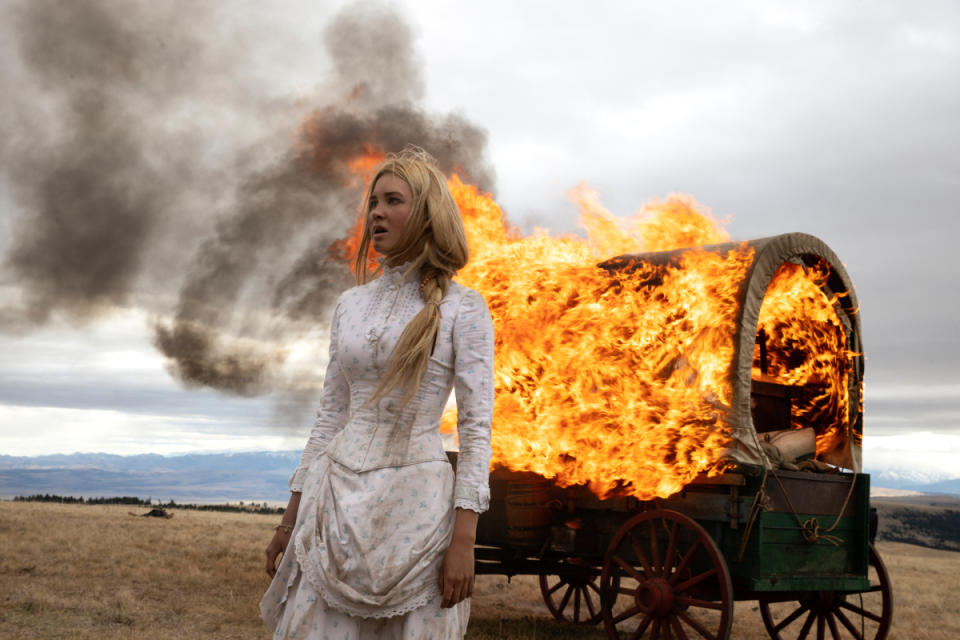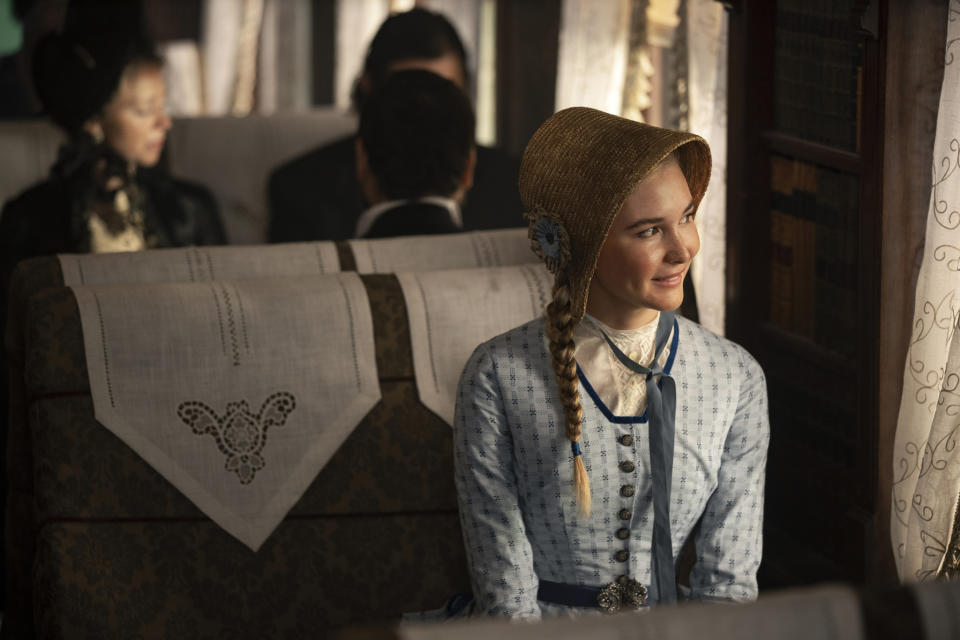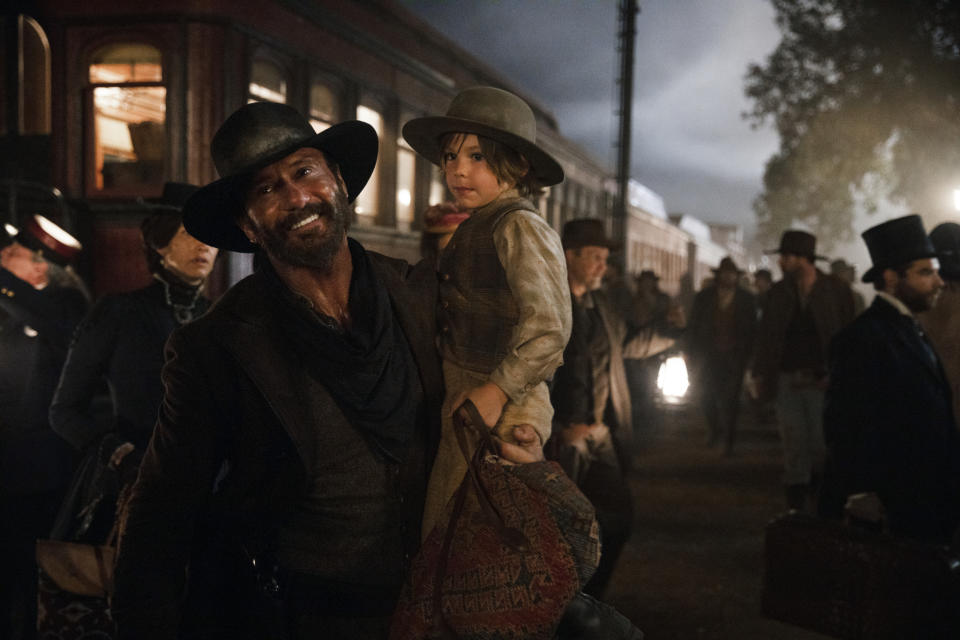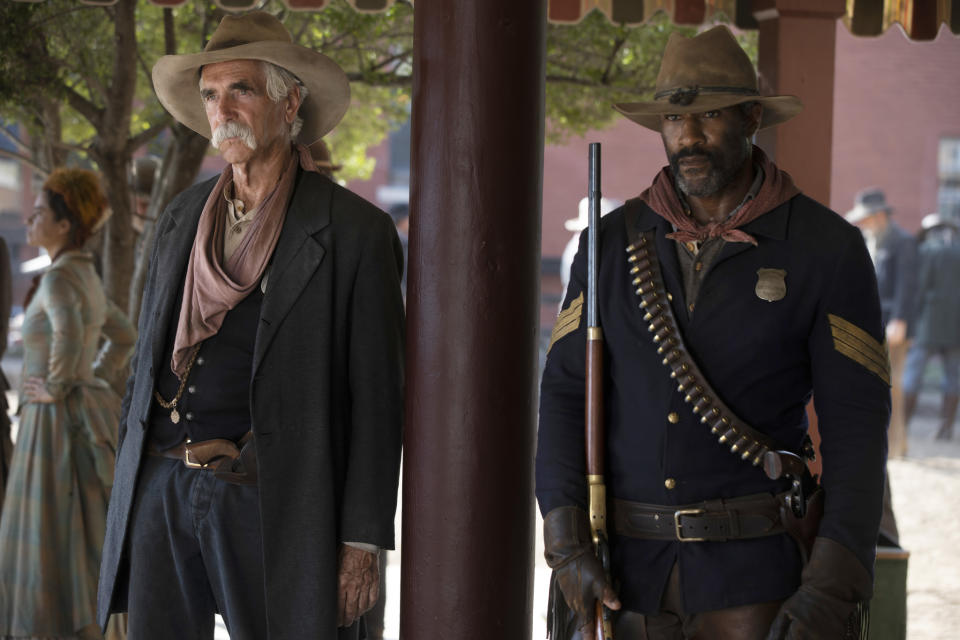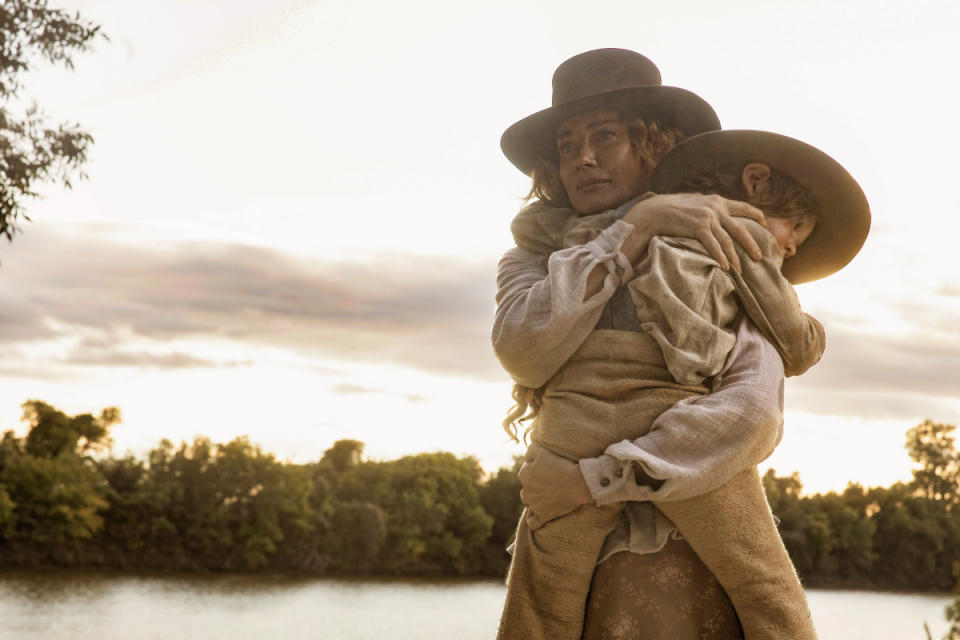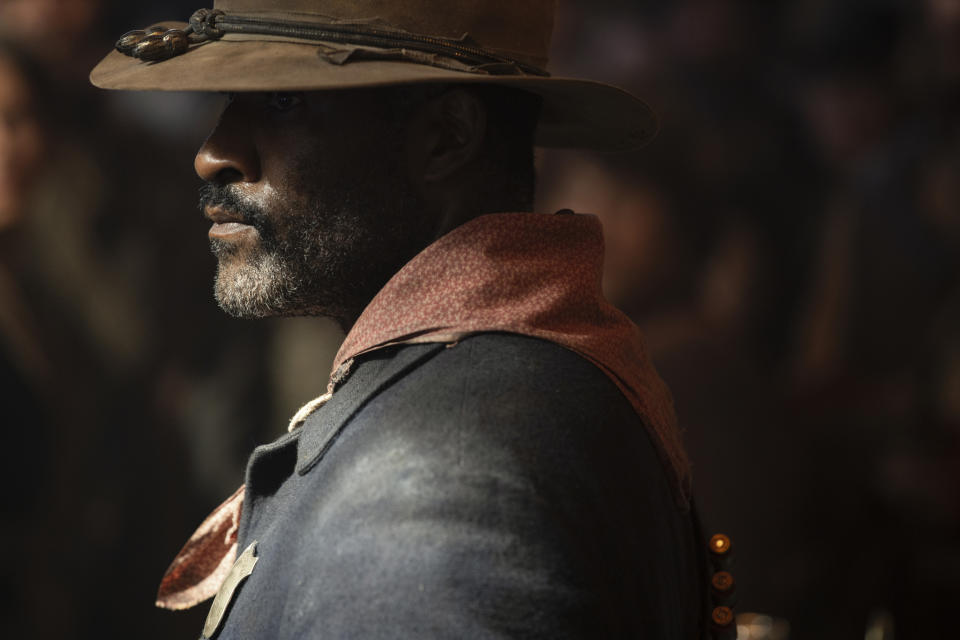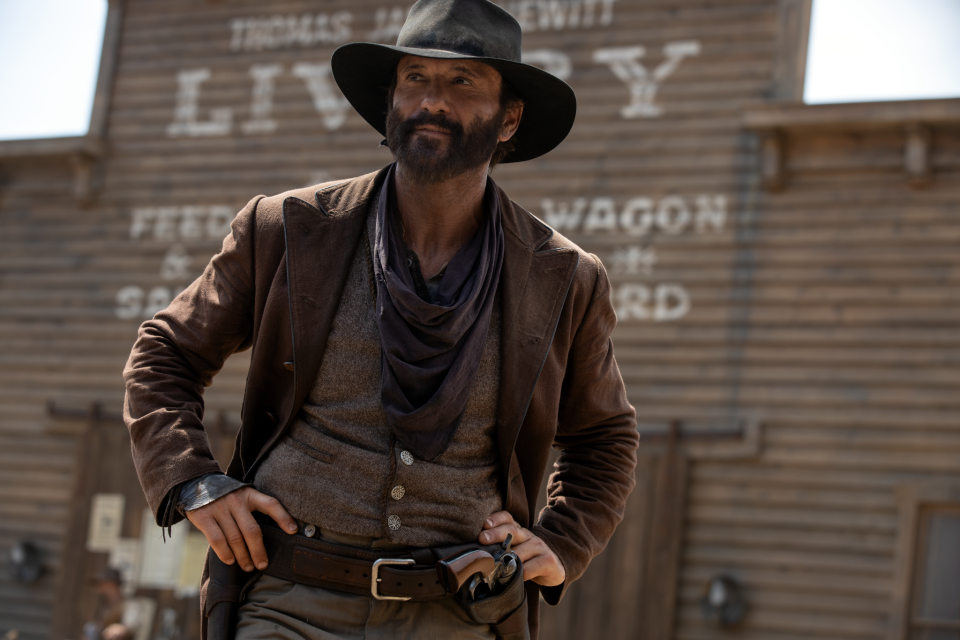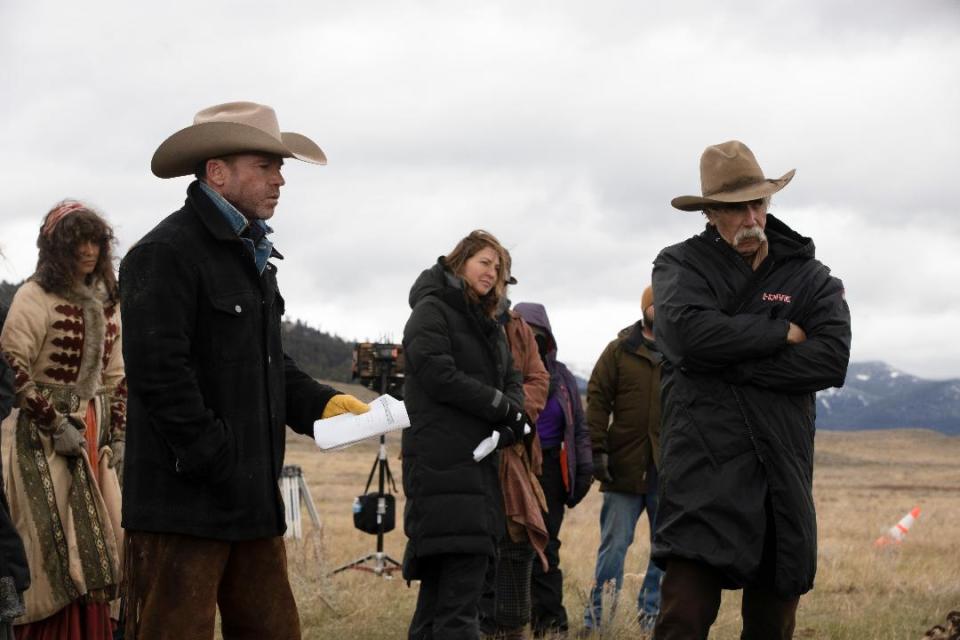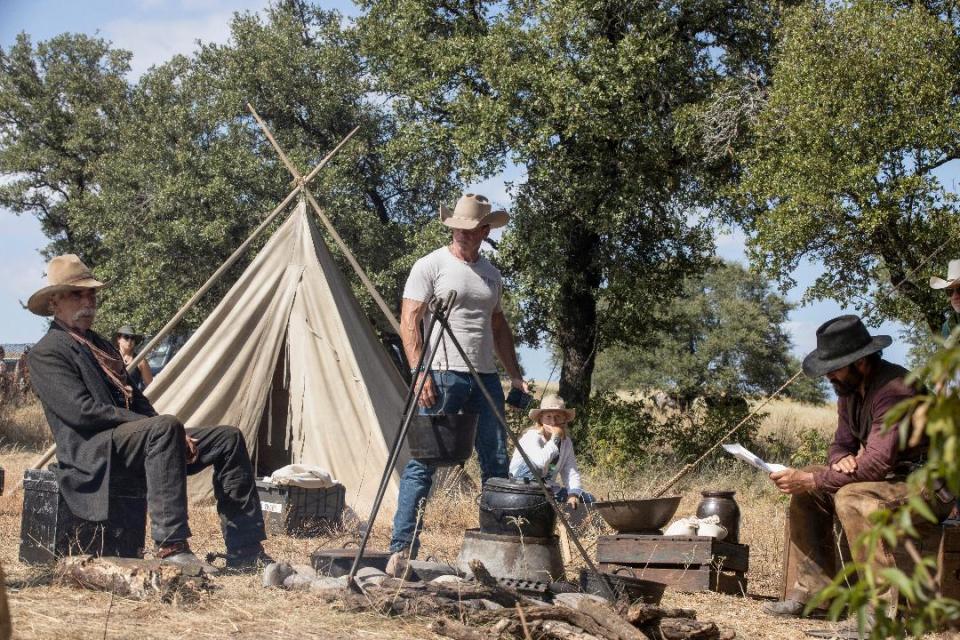Inside The Paramount+ Launch Of ‘Yellowstone’ Origin Series ‘1883’ & All That’s Coming From The Taylor Sheridan Universe
- Oops!Something went wrong.Please try again later.
- Oops!Something went wrong.Please try again later.
- Oops!Something went wrong.Please try again later.
- Oops!Something went wrong.Please try again later.

Before premiering the first two episodes of his Yellowstone origin story 1883 last Saturday at Wynn Las Vegas, Taylor Sheridan described the pace of Westward expansion and Manifest Destiny, at least when ViacomCBS’ just-launched streaming service Paramount+ dictates the timing.
“I was going off to do Mayor of Kingstown, but I had written the pilot episode of 1883,” Sheridan said. “The studio read it April 12, and I was flying out May 2 to go film another TV show in another country. [ViacomCBS exec] Keyes [Hill-Edgar] calls and says, ‘We can hang our hat on this, launch our streaming service with it.’ I say, ‘That’s great.’ He says, ‘We need it this year.’ I said ‘Keyes, that’s not possible, I can start production in February, maybe.’ He said, ‘No Taylor, we need it to air this year.’ ”
More from Deadline
'1883': Paramount+ Unveils Official Trailer For Taylor Sheridan's 'Yellowstone' Prequel Series
'Yellowstone' Gets 'ET' Aftershow Special On Paramount+ With Kevin Costner, Taylor Sheridan & More
Sarah Coulter/ViacomCBS
When Sheridan indelicately told him this would be impossible, the exec responded (knowing that the youngest Dutton, played by Audie Rick, was in attendance, Sheridan changed one key word of the following diatribe): “Look, we are betting the house on this, and we are trucked if you don’t do it. We’re paying you a lot of trucking money, so you trucking figure it out!’ Sheridan continued: “It was impossible to have something air in seven months that wasn’t cast, with no locations, and no other scripts. I said this first episode I’ve written is the best thing I’ve ever written. If I can’t have the time to make it right, I need everything else. I need the toys, I need the cast, I need the team. You will need to trust me, and it’s going to hurt. And I did not hear the word no, at all,” Sheridan told the crowd, adding he hadn’t slept in seven months.
Welcome to Taylor Sheridan’s universe, a place different from any other in the Hollywood landscape. For one thing, like the highly rated Yellowstone, and the Jeremy Renner series Mayor of Kingstown, and the Sylvester Stallone-starrer Kansas City that will shoot in March, and several others that will have stars like Billy Bob Thornton in them, the pilot and every word of 1883’s first season come directly from Sheridan’s laptop. On a recent day while shooting at the 6666 Ranch in Guthrie, Texas — they call it the Four Sixes — Sheridan has two units working at the same time. On horseback, he darts in and out to oversee both shoots. When he returns, he and 101 Studios CEO and 1883 executive producer David Glasser take time to meet with a couple of bankers who are drawing up the paperwork on a deal to buy a nearby ranch that raises cattle and breeds prized horses. There, Sheridan will base many of his future wide-open-spaced series creations going forward. The ranch has a thriving livestock operation, and Sheridan will also be president of the ranch. He was raised on a family farm in Bosque County until his parents’ divorce led them to sell the ranch and force Sheridan along a different path. “That ranch I grew up on was a casualty of the divorce and a traumatic adult event that turned out to be a good casualty because had they not sold it, I would have never left and I’d be the most entertaining deputy sheriff in Bosque County.”
Now, he’s got both jobs, and said the ability to work on that cowboy stuff most days keeps him sane as he works just as hard to live up to the massive five-year deal he signed with ViacomCBS to create premium programming for Paramount+. Sheridan’s buying the ranch with 101 Studios, Ron Burkle and Dan Schryer, and the deal should be final by January. They’ll build production facilities, but keep the surroundings pristine.
The first episode of 1883 debuts Sunday on the Paramount Network after Yellowstone, as the first two can be viewed at the same time on Paramount+. The second episode is again viewable next week on the Paramount Network, before the series moves permanently to the streaming service. Given the big flyover-state following of Sheridan’s Yellowstone, the challenge will be to sell that crowd on ponying up. The drama has a cast topped by Tim McGraw, Faith Hill and Sam Elliott. But the real reason Sheridan was able to make the pressurized deadline set by ViacomCBS came from a chance meeting with an actress you’ve never heard of, but one Sheridan is convinced will be a big star.
“I had kicked around this 1883 idea for three or four years and I had not found the hook, and they were extremely patient with me at Paramount,” Sheridan told me one morning after picking me up in his black pickup, the Bosque Ranch logo emblazoned on its doors. Sheridan looks a guy you’d want backing you up in a barfight. Weathered and wiry, cowboy hat atop his head and clad in what looks like a leather jacket (“It just looks like leather because it’s so dirty,” he tells me. “It’s an old wax canvas jacket, which is waterproof in case you get stuck out there when it’s raining”). I climb in and nearly step on Frisco, his affable Border Collie pup and constant companion who curls up in my lap for the ride to the 6666 Ranch. Sheridan’s training Frisco to help herd cattle and said the dog is a quick study.
Anyway, Sheridan said he was “reading actors for the role of Iris in Mayor Of Kingstown, [Emma Laird got that lead role], and I read Isabel May. What made her wrong for Iris made her, I felt, the personification of this world of 1883.”
Sarah Coulter/ViacomCBS
As Elsa Dutton, May was to Sheridan an opportunity to inject a pure-of-heart narrator with a sheen of innocence, and as a character she is reminiscent of Madeleine Stowe’s Last of the Mohicans, in that she finds herself surprisingly exhilarated and unafraid after crossing from civilized society to the dangers and life and death struggles of the untamed frontier. Trouble was, Sheridan couldn’t really tell the actress, or even the studio, exactly where this was going as it took shape in his head. He just needed to make sure May did not sign on to another series before he figured it out, in a moment when pilots were casting up. May had starred for two seasons in the Netflix show Alexa & Katie and did nine episodes of Young Sheldon. Surely, she’d be gone by the time Sheridan finished writing the 10 scripts for 1883‘s first season.
Sheridan said after May left the room, he was reminded of the time he supplemented a struggling actor’s salary by teaching aspiring actors, and a young Jennifer Lawrence paid her money and signed up with him. Sheridan spent only a little time with her, he told me, before returning her money and telling her there wasn’t anything he could teach her. She had everything she needed already. His only advice: don’t let anyone in Hollywood try to change you. He saw similar things in May.
“I saw she could represent innocence and hope, and I called Paramount and said, ‘I got good news, and then, I got some you need to trust me news.’ At this point I had not figured out how to tell this story and I had Sam Elliott over here and I had Tim McGraw here and Faith Hill and I had not found the bridge between them all. When I met Isabel, the whole story, all 10 episodes, went right through my head. I called Paramount and said, ‘I’m going to sit down and start writing. You’ll have the first episode in about three weeks, but I need to hire the lead, the female lead, who’s a complete unknown, right now, before I start writing. Because it won’t work if we don’t get her, and she goes and does another job.’
“So, to their credit, we made a deal with Isabel after I called her manager and said, ‘I got good news and bad news. Bad news is she’s not getting Kingstown. The good news is she’s going to be the star of this thing with me.’ She said, ‘What is it?’ I said, ‘Well, give me three weeks, but make the deal now. Please trust me.’ And she did the deal. I spoke with Isabel and said, ‘You’re going to do this. You don’t know what it is yet but trust me, you’ll be great. Please say yes.’ She said yes and I sat down and wrote it.”
I asked May about the unusual turn of events.
“Oh, we’re going there, are we?” she said, with a smile that will become familiar to the world at large as the wagon train begins the trek from Texas to Montana this Sunday and that smile lights up the screen. “I tested for a role in the Mayor of Kingstown and I was not right for it, and he knew that, and I knew that,” May said. “Then, he wrote me a lovely little letter and said he would find something for me, and I thought, oh, okay, five years from now. And then, two weeks later, I got a phone call and he said, I haven’t written it yet but you’re Elsa and I want you to be Elsa, do you want to be Elsa? I said, of course I want to be Elsa. Then he outlined what it would entail and what story he wanted to tell, and yeah, I just was swept away.”
One of May’s favorite movies is Frances, and she found herself hoping to one day to play a role in which an actress could play the depths of character Jessica Lange as the tragic actress Frances Farmer. She just didn’t expect it to happen coming right out of her teens.
Sarah Coulter/ViacomCBS
“It’s one of my favorite performances of all time,” she said. “A character study where you’re taken on a journey and that was the first film that I thought of when I read this,” she said. “It is so rare for a young actor, actress in particular, to have this opportunity and it’s quite emotional to think about because…sorry [she gets misty]. [Elsa] is just such a beautiful person, her soul is so beautiful. She experiences the tragedy, and heartbreak, devastation, and love, and has a full arc. There’s so much depth to her, and then, she also gets to become different people. You know, she’s not just one girl. She’s one type of girl that becomes a different type of girl that becomes a woman and becomes a different type of woman. Who gets that chance?”
It is easy to see the potential that Sheridan saw in Elliott or McGraw, who are as tough as anyone on the Yellowstone ranch, and Hill as the matriarch following her husband’s dream West, but mindful of the dangers to her son and daughter. What did Sheridan see that led him to hang much of an expensive series on a relatively untested actress?
“There’s a real depth to her,” he said. “She’s very young and I liked that innocence, but not naivete. She’s not blind to the world. Some people, there’s a certain goodness that permeates from them and she has that. Tom Hanks has that. When you see him in the movie you feel like, that’s a really good man, and if you’re lucky enough to meet him, you’ll realize, he is a really good man. She has that same quality and I felt like telling the story from the perspective of a 19-year-old girl coming of age and in one of the most hellish events that a family could endure was a fascinating prospect for a storyteller.”
This kind of thing seems to happen often since Sheridan and ViacomCBS and MTV Entertainment Studios signed that five-year deal close to $200 million, to become the beachhead series creator for Paramount+. Sheridan might well have six series on the air by end of 2022 for the company, including more Yellowstone. They pay him millions of dollars for his scripts. Because of the rush to make this Sunday’s series launch, ViacomCBS stepped up to an 1883 budget well in excess of the one for Yellowstone, cable TV’s highest-rated show.
When I meet ViacomCBS president and CEO Bob Bakish in Vegas after the premiere, 101’s Glasser was reviewing with the topper some of the Sheridan-generated series they are planning. I joke they should be careful, they are working Sheridan like a rented mule.
“Oh, this is no rental, this is bought, and we are all in on Taylor,” Bakish said. Glasser said that Sheridan wouldn’t have it any other way, especially with the ranch as his primary base. The two nights I was there, Sheridan and his team ended shooting days cooking up massive dinners in the main ranch house and feeding everyone from cowboys to crew guests. After, Sheridan, Glasser and co-EP and editor Michael Friedman watch dailies in an Airstream trailer right outside, and cut scenes from the day’s shoot. Sheridan will knock back a glass of scotch on the rocks along the way, turn in early and wake up at the crack of dawn to get on a horse and do cowboy things. If he’s not shooting, he’ll write when he returns. If he is shooting, he’s back by the time the cast is up and ready, early in the morning. The green light decisions are made by MTV Entertainment Studios, and Viacom Group President Chris McCarthy. But they leave Sheridan alone.
Sarah Coulter/ViacomCBS
“The most challenging thing has been, I’m a musician, and I’ve seen more sunrises in the last four months than I care to see for the rest of my life,” said Tim McGraw, who plays James Dutton, the great grandfather of Kevin Costner’s John Dutton character. “I guess I’ve seen a few sunrises as a musician, but those were self-inflicted sunrises. I don’t want to see any more sunrises for a while.”
Populated mostly by a production team that Sheridan began building when he directed Wind River, the set has an easygoing manner and a shorthand. After Hill sits on horseback, repeating a scene for a long time, the radio crackles that she needs a Red Bull. Husband McGraw, who isn’t in the scene but watches intently anyway, trots over to her and delivers it, and jogs away with it after she takes a few sips. Later, when Hill walks past me and others out of the camera shot, not knowing who we were, she smiles and says she is getting some stew. Would we like her to bring some for us?
Elliott, whose interplay and closeness with LaMonica Garrett as former Pinkerton Detectives who’ve committed to steering 30 wagon trains of mostly Slavic dialogue-speaking settlers across the plains resembles that of Tommy Lee Jones’ Woodrow Call and Robert Duvall’s Gus McCrae from Lonesome Dove, found a way to become even closer.
“I met Lamonica and we hit it off pretty quick,” Elliott said. “It’s one of the things I’m most enjoying about this character, is that this white guy and this Black guy are like brothers in the 1800s, and man, the stuff we’re doing is so much fun. So we’ve got these cowboy teepees, and one of them was bigger than the other, and in a couple of the earlier episodes, they’re sitting side by side. It’s where we’re supposed to stay and where we keep all our stuff. I figured, one of the teepees is plenty big for both of us. Why would we need two?”
Sarah Coulter/ViacomCBS
When I suggest that getting a big teepee is a sign of having a good agent, Elliott laughs and says, “The one tent is big enough for two guys. So we’re now not only two brothers traveling together, a Black guy and a white guy, we’re both sleeping in the same tent now. Nobody but me and LaMonica even knows it, because it’s behind the scenes stuff, but it makes us feel better.”
The loyalty was evident when an actor playing the cook for the wagon train left. Sheridan called James Jordan, who has played everyone from the killer in Wind River to a Yellowstone lawman and had just finished starring with Renner as a prison guard in Mayor of Kingstown. While Jordan might have had vacation or other plans, those were scrapped and Jordan showed up the next day and could be seen yelling at the Slavic language speaking settlers not following his rules, which they have little hope of understanding no matter how loud he yells.
Shooting An Epic On Westward Expansion Is Hard
In the course of the first season, the wagon train led by James and Margaret Dutton (McGraw and Hill), and two Pinkerton agents (Elliott and Garrett) endures dangerous river crossings, wild weather swings and blinding dust storms. Cast members told me that conditions could be terribly difficult, particularly the harsh cold of Montana. They were quick to add that they would do it all over again. The common reaction is they all felt they couldn’t recall being offered scripts quite as good as the 10 Sheridan wrote and sent them.
“Tim probably had said yes by this point, and look, I knew Taylor was an amazing writer,” Hill said. “But going in to do something with my husband…we had been asked to do this a lot, to be on screen together. This needed to be something that could not be compared to anything else, period. It’s just not something I wanted to give away. Upon reading the first couple of episodes, wow. Holy cow, is this amazing. So I said I was very interested. This sounds like it could be it. And the episodes just kept coming in, and I just had never read anything like it, to be honest. And then, the perspective from Elsa’s voice, that she carries this show and how it’s seen through her eyes and her voice. As a woman, as a mom with three daughters, I just thought, ‘My God, this is extraordinary writing for anyone, but for a young woman, it’s really extraordinary.’ And I just felt the characters were great. They were colorful. They were intense. There’s tragedy. There’s passion. There’s a little bit of humor, and Sam and LaMonica bring that in various ways. I just thought, this may be the time that we could actually do this together. I was just blown away by the writing, and by the writing for Isabel just floored me.”
So caught up in Sheridan’s prose, Hill hadn’t really considered the price she and the cast would pay to shoot it.
“I pretty much underestimated it all, if you want my honest opinion,” Hill said. “I knew that I was not afraid of hard work. I don’t think anyone here is. Tim is not. We grew up with hard working parents and that’s the only way we know. Taylor did say that this would be unlike anything we had ever done before, and that the work would be really, really hard because he’d want it to be authentic. It was hard, physically and mentally challenging, but we were trained by the best of the best, the wranglers, the stunt men and women. Guns and armory, the set, the costuming, everything just put us there in that place, in that time. So it was harder than we thought including driving that wagon, but I learned to love it. And better on the wagon than I am on a horse.”
For Garrett, the chance for a Black actor to play a starring role in an 1800s Western, and be depicted in the show’s credits, is a milestone that made him most proud.
Sarah Coulter/ViacomCBS
“[My character] Thomas was a Buffalo soldier, and Shea [Elliott] was his captain,” Garrett said. “They fought the war together, they’ve been battle-tested together, and when the war ended, the Buffalo soldiers’ jobs turned into something that they didn’t sign up for. So, they became Pinkerton agents, and they’ve just been joined at the hip since then. They’ve been traveling, helping people, been protecting people. Thomas knows Shea like no one else, and Shea sees Thomas. Now, in this time period, you could walk around every day and not be seen. Just because people lay eyes on you doesn’t mean they see you. Shea was one of the first people that saw Thomas, and they just became inseparable.”
Growing up, Garrett watched some Westerns, and of course he noticed that Black characters were barely seen.
“I get emotional about it,” he said. “My background, my parents’ background…my dad, his family, a lot of brothers and sisters, they were sharecroppers in Mississippi. My mom, she was raised by a woman who was born a slave, her grandmother, and it’s significant. The opening credits of a show weren’t usually there for Black actors. Raymond St. Jacques was the first, in the last season of Rawhide when there a sketch of his face, and Otis Young was one of the first to have his name in the opening credits of The Outcasts. There was Danny Glover, though they didn’t have the faces in the opening of Lonesome Dove. So, having my name and your face in the beginning as one of the stars of a Western, in that tintype, black and white, old…I saw that at the theater a couple weeks ago in Amarillo. They showed it for the cast and crew, and at first, I didn’t want to go because I didn’t want to see things that might get in my head or affect my performance. But as I saw it, and my face popped up…I haven’t cried that much since my friend’s funeral, four years ago. It affected me. I don’t know where it came from. Knowing the history of it, and doing my research, and just knowing what I saw and what I didn’t see growing up, it all came to that moment right there on that screen.”
The Western he most admired was Clint Eastwood’s Unforgiven, also a favorite of Sheridan’s.
Sarah Coulter/ViacomCBS
“There’s a line I have quoted all the time for the last 20 years,” Garrett said. “It’s at the end of the movie when Clint Eastwood’s William Munny is about to shoot Gene Hackman’s Little Bill in Greeley’s Tavern, and when Bill says he doesn’t deserve this, Munny says, ‘Deserve’s got nothing to do with it.’ And Bill says, ‘I’ll see you in hell, William Munny.’ There’s a moment in this season where, when we got to it, Taylor came over and said, ‘Let’s meat this up some more. Before you shoot him…Taylor gave me this little thick monologue. It didn’t hit me until we were done shooting and I got in bed that night. I called my wife and said, ‘I had my William Munny moment!’ ”
But Garrett acknowledged the price paid by cast and crew.
“There’s a reason they don’t try things like this that often and why Lonesome Dove was one of the last ones,” he said. “It’s difficult. You’re traveling with all these wagons, these weather conditions, the wind, the river-crossing, the horses, just the…it should be basic cowboy stuff, but the horses know when a storm’s coming. They know when wind is about to change, and they start getting antsy, and you’re supposed to be riding and shooting and doing all this stuff on this horse, and he doesn’t feel like being there. That makes it hard for everybody. So, the wrangler’s got to come, you know, walk the horses, tame them, and that makes the day go longer. Everything is against you when you’re outside in these conditions, 98 percent of the time. We’re not in studios. It’s not five wagons that, you know, they CGI into 25. They’re traveling with us. Everywhere we go, we exhaust all the resources of whatever town we’re in. We have like 400 cast and crew. We’re living on a ranch, no cable, no cell service, no wifi. But it’s beautiful, and I think that’s why, as hard as it is over here, it translates to the film, and that’s why people love seeing these kind of pieces.”
Elliott seems as natural for a period Western as a saddle on a horse. He said he felt he’d done enough Westerns to be typecast, and has turned down many offers until Sheridan called and sent him the 1883 script. As he read the first pages describing a tragedy in the life of his character Shea Brennan, Elliott was hooked immediately.
“I don’t know that I ever thought about a legacy for myself, so to speak,” Elliott said. “I just thought about how fortunate I was to do what I wanted to do when I was 9 years old, because of my Western heritage and my family’s for several generations, they were all Texans, and most all of them from West Texas. I think that the Western genre automatically spoke out to me on some level.
“It’s strange to me how parts in Western films have come around to me and continue to,” Elliott said. “I was working for John Milius on a show called Rough Riders and I got a call from my agent and they said hey, there’s this thing coming to you from the Coen Brothers and I was so excited…because I’d been doing a series of these Western things and there was a moment in time where I really believed I was never going to get out of this genre, that people weren’t going to see me away from this. So, I get this script and I’m so excited about it because I think I’m going to play some wacky character in some Coen Brothers movie called The Big Lebowski. I start reading it and I start looking at the character script and I said, ‘What the f*ck, it’s another cowboy!’ This one’s a drugstore cowboy, but still, it’s a cowboy. The film wasn’t a Western, but the guy is a cowboy. Sitting at the bar with a cowboy hat on. Dressed like a cowboy. Talking like a cowboy. Down through the ages. Through the sands of time. You got to be careful, I guess, how many Westerns you do or they’re going to think that’s all you can do.”
Sarah Counter/ViacomCBS
Why did he return and put back on the cowboy hat?
“Taylor’s script,” he said. “I knew his work as an actor, and because of his films. Sicario, for starters. The thing he did with Jeff [Bridges in Hell or High Water] blew me away. The guy writes brilliant stuff. I love his dialogue. I love that it’s spare and he doesn’t waste a lot of words. That speaks to me. At the same time, it’s intelligent, insightful. It’s all those things that an actor would love to do and it’s always fun to see yourself in some role that’s more interesting than you are personally. That is such a gift.”
Perhaps the most complex character is McGraw’s James Dutton, the connective tissue between 1883 and Costner’s Yellowstone character John Dutton. James Dutton is a farmer, but the first time we see him, he’s racing his wagon away from a band of horse thieves. By the time the dust settles, he’s killed every last man. We learn in flashback that he was a Confederate officer with a bad case of PTSD – in a scene he shares with Tom Hanks. James Dutton has seen enough of Texas and his only concern is bringing his wary wife, daughter and son far West for a new life with the promise of solitude. He is part of a wagon train only because he becomes persuaded there is safety in numbers.
McGraw has shown a screen presence in films like Friday Night Lights and The Blind Side, but his priority has long been singing and touring as one of C&W music’s top performers. 1883 is by far the biggest challenge he has faced onscreen, and McGraw threw himself into it. Like everything in the Taylor Sheridan Universe, it started with the phone call from Sheridan.
“I always thought I’d love to do a Western, if something good ever came along,” he said. “The way it worked with Taylor was, my agent said Taylor wants your number. Yes, give it to him. He asked if I was a fan of Yellowstone, and I said of course I was. He asked if I would like to be on the show. I told him I’d love to do it, but I didn’t want to just be some sort of singing cowboy that comes on and gets taken to the train station or something like that. He goes, well, I might have an idea. Give me a week or so. And then, he called me back, and he told me the idea that he had, to do a flashback scene with me as the original Dutton who founded the Yellowstone Ranch. And I thought, now, that’s interesting. I really like that. And that is how the whole ball started rolling.”
McGraw said at that point, Sheridan never mentioned the possibility his character would anchor a spinoff series.
“I didn’t know if he knew then or not, but he didn’t tell me he knew that,” McGraw said. “But knowing Taylor, I’m sure he had that idea cooking in the back of his head. So we shot the flashback scenes, and a couple months later, I got a call from him. He says, you know, dude, I just showed these scenes to the studio, and they want to do a prequel of all of this, if you’re interested in it. I’m like, well, yeah, I’m interested. And then he started sending the scripts, and I was just blown away. This is one of the best things I’d ever read. Faith and I, we both kind of became obsessed with them. And then Sam got involved.”
The decision came down to what he and Hill wanted to do with the next chapter of their lives. They are now empty nesters, their three daughters off on their own. They could certainly continue on their comfortable musical track of recording and touring. But those scripts…
Sarah Coulter/ViacomCBS
“We knew we were in for a lot, that this was going to be a huge production with a lot of work, that it was going to take a lot of people to pull it off, and it was going to take a lot of elbow grease,” McGraw said. “I remember, we had the contracts on our porch, and we were sitting there looking at them. I told Faith, first off, when we sign these contracts, we are not the boss anymore. And then secondly, we’re either going to be burning hot or freezing cold, and there’s never going to be any in-between. That’s the way this shoot’s going to go, and it’s going to be a lot of hard work. Of course, she’s a hard worker, so she was ready for it, and we’d fallen in love with the scripts so much. But we did think about the logistics and how hard it was going to be to get everything done in the time frame they were shooting for.”
As for the expansion of the Dutton mythology, McGraw said he and Costner have not compared notes. “When I was on set doing Yellowstone, we texted back and forth a few times but never got the chance to hang out. So I don’t really know Kevin, but I feel like I know John Dutton from watching Yellowstone so much,” he said. “I think the show will stand on its own and you’ll love it if you watch Yellowstone or you will go and watch Yellowstone to see the continuation of the story. But here you’ll see the gene pool of the Dutton family and the correlation between the original family to the modern Yellowstone Dutton family. You’ll see where the toughness, the stubbornness, the dedication to family comes from.”
McGraw respected that his character carries physical and existential war wounds and a stint in a Union prison camp that almost killed him.
“One of the things that drew me to James’ character is he’s such a complex guy, and there’s so much going on in his head, and so much in his backstory,” he said. “And the arc of his character; he starts out caring only about his family, but grows to care about these people he’s leading. He may not show it, but you can see it in his actions and the things that he does. His PTSD is certainly there, and that’s part of what I put on him right away, from his time in the Civil War. In my mind, I don’t think he wanted to be a part of that war anyway, and didn’t believe in it. And then the South after the war and Reconstruction and the terrible mess that was made, I think that he just wanted to get out of there, and take his family to an untainted place. I think he is trying to escape his ghosts. I don’t know that he ever clearly escapes them but hopefully, he finds peace down the road. But I think that it’s something that’s always there in him, and it’s something that drives him, that and the love of his family.”
What’s Next In The Sheridan Series Universe
“I don’t know how to make a TV show,” Sheridan told me at one point, at least not the way that other prolific show creators like Chuck Lorre, Shonda Rhimes, Ryan Murphy and Greg Berlanti do it, which involves a lot of delegation and trust. “I don’t have any idea and don’t really care to learn. I don’t do pattern budgeting, or write act breaks into things. I write 10-hour movies, and go shoot them. I don’t have a writers room, I’ve written them all myself. It’s not for lack of effort, I’ve tried three times.”
Why hadn’t it worked?
“Maybe this is coming from a bit of a place of ignorance because I’ve never been in a writers room, but there are certain tropes and structures that TV shows have relied on for a really, really long time,” he said. “Certain buttons and A stories and B stories that you can drop them into any show, I don’t do that,” he said. “So, for someone who’s an experienced staff writer to come along and attempt to figure out this bizarre stream-of-consciousness writing I do, it doesn’t make a lot of sense to them. I don’t do outlines. I’ve just sat down and written all the episodes before we started filming. That way everybody knows what we’re doing, all the way through.”
Sarah Counter/ViacomCBS
Sheridan to this point has been so hands on that he will work solely on one season of a series at a time, take a couple weeks off and then face the next 10-episode season deadline. Ideas and creative solutions come to him often while he is on horseback, doing what to him is the meditative ranch work that Yellowstone’s John Dutton not coincidentally has taken up this season since recovering from near-fatal gunshot wounds.
Sheridan’s strategy was somewhat inspired by that memorable first season of True Detective that starred Matthew McConaughey and Woody Harrelson, and had the authorship of director Cary Joji Fukunaga and creator Nic Pizzolatto doing all the episodes. The result was game-changing for actors and filmmakers, who saw the limitations of two-hour movie run times eliminated, with characters able to reveal themselves slowly.
“What Cary did, I am doing,” Sheridan said. “Write 10-hour movies and go shoot them. I’ve been working with the same crew since Wind River and we have such a shorthand. It’s still challenging, because everything I shoot takes place outside for the most part and we’re beholden to the weather and have to force our way through. But at the end of the day, to go to some of these locations where most people have never been, where you’re opening up a new world, and all of these places or characters in the story, to me, it’s fascinating.
“Because it is so hard, physically, on the actors, on the crew, I feel like the shots look earned. And because Paramount trusts me and gives me the time to go shoot 10 to 14 days for a television episode, we can treat it like a movie, and it looks like a movie. We can take the time to rehearse it and light it and build these set pieces. And if I call them and say, I need two helicopters in one day, they just go, all right.”
Sheridan, who only stopped directing every Yellowstone episode because he was obligated to direct the Angelina Jolie film Those Who Wish Me Dead, has by necessity begun to loosen his grip a bit.
Over the last five years Glasser has spent most of his time in Sheridan’s orbit after exiting The Weinstein Company to form 101 Studios, staking $20 million to keep the then modestly rated Yellowstone going. 101 cohort David Hutkin runs the rest of the business in Hollywood, and they handle things like marketing and other tasks to simplify Sheridan’s life. Glasser said that when Sheridan refers to a writers room, he knows they’re necessary, but that doesn’t mean he has to spend his days in one because his gift is creating shows and writing scripts. Before, the process was Sheridan kicking round ideas for his Yellowstone castmember Hugh Dillon for Mayor of Kingstown, and EP Antoine Fuqua. Now that Sheridan has become a mini industry, 101 is surrounding Sheridan with experienced writer-producers to run the shows with him and who know what they’re doing.
The Sopranos and The Wolf of Wall Street’s Terence Winter signed on to shepherd Kansas City, for which Sheridan wrote the pilot. In his first major series role, Stallone plays a loyal mobster in New York who thinks that finally he’ll become a boss and put in control of a major territory. They give him Kansas City. In a fish-out-of water-drama that has the violence and humor of Goodfellas, Stallone’s mob boss has to figure out how to navigate and control a city filled with legalized marijuana shops, designer coffeehouses, hipsters and skinny jeans.
The series, and Stallone’s commitment, came together as most things do in Sheridan’s world. Quickly.
Said Glasser: “On Kansas City, I call Taylor on a Friday, and I say to him, we love Stallone and we’re both looking for something for him, why don’t we do something in the mob space? I’ve always wanted to make Mario Puzo’s Omerta, and I said, Taylor what if you came up with the cool wildness of Goodfellas with Stallone. He takes a breath, I’m not even joking, and he goes hmm, that’s a good idea, Glasser. Then, on the spot, he proceeds to spend 45 minutes pitching me a story that he just created in his head. This is Friday at 3 p.m. It is a great story, and nothing is written down. By Sunday afternoon, he handed me the pilot. I couldn’t believe it. I call the network, I say, ‘I have another show that Taylor just finished.’ They go, ‘What do you mean?’ Meanwhile, Taylor calls Sly that Sunday and he says, I have this idea. I’m going to write it. What do you think? He pitched it to him and Sly said yes on the phone. By the time we got to the network on Monday, we had a script and Stallone attached.
“This is how it happens with him,” Glasser said. “He just picks up the phone and calls people like Billy Bob Thornton, Tom Hanks, Sam Elliott, Tim McGraw and says, hey, I’ve got this idea. I call to do the deal with the agent afterwards.”
Another drama series on the front burner is Bass Reeves, and Sheridan has secured as showrunner Pat Charles, whose writing-producing work includes the CW series Black Lightning, Iron Fist and Bones. Charles is writing that pilot and will run the show with Sheridan. They are zeroing in on a star they wouldn’t name to play the title character, who was considered the greatest Black lawman who lived in the 1800s.
Also in the near term is Lioness, a fact-based drama about a U.S. undercover female operative program in which a pair of operatives are sent to infiltrate various nefarious cells involving everything from drug cartels to the war in Afghanistan. Sheridan wrote the first two episodes and they are zeroing in on cast he would not name. Tom Brady (Hell on Wheels and NOS4A2) will be the showrunner with Sheridan.
Finally, there is Land Man, a drama inspired by the Texas Monthly and Imperative Entertainment podcast “Boomtown,” about the oil boom in the Permian Basin in West Texas. Sheridan will write at least the pilot for a drama full of roughnecks and wildcatters.
There is also the fifth season of Yellowstone to begin production in May, and second seasons of Mayor of Kingstown and 1883, 10 episodes each. In the current season of Yellowstone, Sheridan has been teasing the prospect of a Texas-set spinoff series to take place on the 6666 Ranch they’re purchasing, but he said that one hasn’t quite taken shape yet. Future seasons of 1883 will likely evolve into the development of the Duttons through the years, rather than being an endless wagon train ride.
Sarah Coulter/ViacomCBS
Why Sheridan Is A Man On Fire
Much of Sheridan’s motivation came from the hard lessons he learned coming up, and that includes acting and screenwriting. For instance, he doesn’t have time to write movies right now, but you won’t likely find him doing that for films he doesn’t direct, after the disappointment he felt with the Tom Clancy adaptation Without Remorse. As for his prolific pace as a writer and storyteller, the words started pouring out of him when he saw the writing on the wall for his acting career. He’d been trying out for and playing parts for years — he first became aware of Yellowstone stalwart Cole Hauser after Sheridan auditioned for the Wooderson character in Richard Linklater’s Dazed and Confused that launched the career of Matthew McConaughey — but Sheridan’s comeuppance came while playing his highest-profile role to that moment, the sheriff in the lawless hometown of Sons of Anarchy. Any illusions he had about his worth were shattered when it was time to negotiate an extension.
“I’ve always said Hollywood will tell you what you’re supposed to be doing, if you will listen,” he said. “At that time, they were offering me what I thought was a very unfair wage. It was less than virtually every other person on the show, and not enough for me to quit my second job. So, the business affairs attorney, who I won’t name, here’s what he told my attorney who said, look, there’s kids on the Cartoon Network making more than you’re offering this guy.
“The guy goes, ‘I know and you’re right that he probably deserves to make more, but we’re not going to pay him more because guess what, he’s not worth more,’ ” Sheridan recalled. “‘That’s what he’s worth. There’s 50 of him. He is 11 on the call sheet. That’s what that guy is, and that’s all he’s ever going to be.’ And that’s really when I quit. It wasn’t so much over money. It was so much more that that’s how the business saw me. It wasn’t just this jerk business affairs attorney who simply articulated what obviously was said in a room with a bunch of executives when they decided ‘Nope, we’re going to save a dollar here. He’s easy to replace because he’s just not that good at his job. Let’s replace him with someone cheaper.’ And I decided right there that I didn’t want to be 11 on the call sheet for the rest of my life. Now, I am happily 11 on the call sheet on Yellowstone, but I don’t think anybody wants to watch me do anything on television for an hour because the business told me they don’t. They told me I’m supposed to story tell behind the camera. And so, the only reason I am in front of the camera playing [the horse trainer] Travis is because I grew up on a ranch, riding horses. There’s just not another actor out there who can do those things on a horse.”
Influenced by writers ranging from Toni Morrison to Hemingway, Steinbeck, Cormac McCarthy, Larry McMurtry and from reading a lot of American history when it got too hot to be outside on that Texas ranch he grew up on, Sheridan hunkered down and began writing. Those writers were the inspiration, and the guard rail was all the bad, cliché-ridden scripts he routinely read for auditions. He had Mayor of Kingstown kicking around his head for a decade, but the first script he finished and sold was Sicario, which in the hands of Denis Villenueve became a harrowing cartel thriller. In quick succession, the scripts finished included Hell or High Water, the Sicario sequel Soldado and then Wind River, the latter of which gave him his directing debut.
His current station is much better than 11 on a call sheet. Paramount+ is showing a voracious appetite to order up as many series as he can create, for a streaming service whose subscriber potential rests on his broad shoulders. And when he cold calls and then sends his scripts to Kevin Costner, Jeremy Renner, Sylvester Stallone, Tom Hanks, Billy Bob Thornton, Sam Elliott, Tim McGraw and Faith Hill, more often than not they respond to his writing by starring or guest starring in his work. Sheridan acknowledges that he is in a sweet spot right now, but past tough times keep him from taking it for granted. There is no telling when people might get tired of what he’s writing, he said. So for now, he’s determined to make the absolute most of it.
Best of Deadline
Hallmark Channel 2021 Christmas, Haunukkah & Holiday Movies Schedule
New On Netflix For December 2021: Day-By-Day Listings For TV Series, Movies & More
Sign up for Deadline's Newsletter. For the latest news, follow us on Facebook, Twitter, and Instagram.

